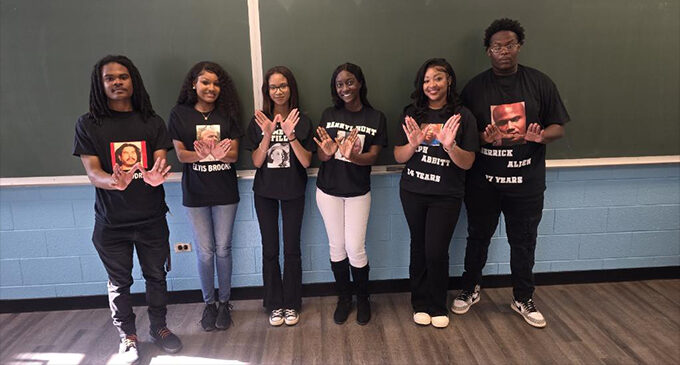College course teaches students about faults in criminal justice system

Dr. Radscheda Nobles has been a professor at Winston-Salem State University for the past six years. She is one of the most respected professors at the university and her students are very fond of her and her classes. One of her classes has really sparked an interest in her students due to a class project.
For Nobles’ class, Victims and Crime, the students engage in a class project each semester.
“I saw a hole in the department where we weren’t supporting the community,” said Nobles. “We don’t have much time to do it as a department, so I decided to do it as a class project. Every class has a project. We may feed the homeless or do different activities in the community.
“My students are responsible for looking up different agencies in the area and seeing what they need. I am really big about that because a lot of times when we create things, we don’t ask the people what they need, we just make an assumption.”
For this semester, Nobles chose to have her students research a person that has been wrongly convicted of a crime, spent time in prison, and was later exonerated. The project then took on a life of its own and grew. The students dug deeper into the project and made T-shirts, shared their results with the student body and chancellor, and even attempted a fashion show.
“My students are used to my community projects, they get bigger every year,” Nobles said. “We have grown but this one in particular was a little bit harder, but I know it was something that needed to be done.
“I am glad that my students helped me push through because I was just going to tell them to research a person and carry it through, but they said no. As a professor, I allow my students to see that this is not a black and white issue, even though more brown people are convicted and fall under these traps. It’s men, it’s women, and I tell them it could be one of them.”,
According to Nobles, her students continued to push the project beyond the original scope she had in mind. They learned more than they initially anticipated when the project started.
“It really just opened my eyes and helped me realize that the system we live in is imperfect,” said sophomore Javaryon Bruton. “We should also pay more attention and bring more awareness to the people who have been victims of the system.”
Bruton says this project has not changed his views on the American justice system; however, it has opened his eyes to the changes that need to be made.
“I already know that our system had errors and flaws in it, but it’s definitely unfortunate that a man doing something … something as innocent as taking care of his child, could lead to him being convicted and spending 17 years of his life in prison.”
Senior Yasmyne Vann said this project shed more light on the topic that she already had some knowledge on. It helped her get a better grasp on the focus of her career goal following graduation.
“I came into college wanting to be a defense attorney, but I actually want to be a prosecutor now to help with sentencing, to help with the falsely accused being incarcerated,” said Vann.
Iverson Brown was instrumental in pushing the project forward. The project showed her that initiatives such as the Innocence Project should be more publicly showcased and would love to work with them in the future.
“I absolutely do want to work with the Innocence Project and working with people who are in prison to have proper rehabilitation,” Brown said.
Jada Jones was adamant about wanting change in the criminal justice system. She feels change is needed in leadership, along with the goal of prison; is it to punish or rehabilitate?
Many of Nobles’ students expressed a desire to continue the lessons they have learned in her class. The ripple effects of this project could prove to have an impact on how those who are wrongly convicted locally are treated in the future and that was something Nobles holds close to her heart.









